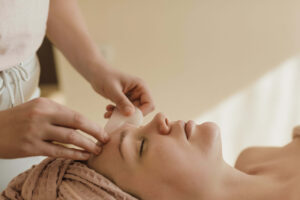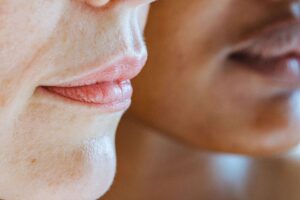Customize Your Gua Sha Facial Routine

In the ever-evolving world of skincare, ancient practices like Gua Sha have made a remarkable comeback. Originating from traditional Chinese medicine, Gua Sha is a facial massage technique that involves scraping a flat, smooth tool, typically made of jade or rose quartz, across the skin to promote circulation and lymphatic drainage. To maximize the benefits of this practice, it’s crucial to understand Gua Sha facial charts. These charts help you target specific areas of your face to address various concerns. In this beauty blog, we’ll explore the art of Gua Sha, delve into the significance of Gua Sha facial charts, and provide insights on customizing your Gua Sha routine for radiant and rejuvenated skin.
The Revival of Gua Sha
Today, Gua Sha is a popular facial massage technique embraced for its ability to rejuvenate the skin and promote a radiant complexion. By gently scraping the skin’s surface with a Gua Sha tool, you can stimulate blood flow, reduce puffiness, release muscle tension, and help skincare products penetrate more effectively.
Gua Sha facial charts play a crucial role in customizing your facial routine. These charts depict the meridian pathways on your face, which are believed to be energy channels that correspond to various organs and systems in the body. By targeting specific meridian points, you can address different concerns and promote overall well-being.
Understanding the Meridian Pathways
Before customizing your Gua Sha routine, it’s essential to grasp the basics of the meridian pathways on your face. Each meridian is associated with particular functions, emotions, and physical aspects. Here are some key meridian pathways and their significance:
- Tai Yang (Bladder Meridian): This pathway runs along the side of your face, starting from the temple, moving down the side of the neck, and extending to the shoulder. It is linked to relieving tension and headaches.
- Yang Ming (Stomach Meridian): Beginning near the mouth and extending down to the collarbone, this meridian is associated with digestion and energy flow.
- Shao Yang (Triple Burner Meridian): This pathway covers the side of the face, starting from the temple and extending to the jawline and neck. It is linked to regulating body temperature and balancing energy.
- Tai Yin (Lung Meridian): Starting from the chest and extending up the neck, this meridian is associated with emotions, especially grief and sadness.
- Shao Yin (Heart Meridian): This pathway extends from the chest to the tip of the tongue, representing emotional well-being, love, and joy.
- Jue Yin (Liver Meridian): Covering the forehead and the area between the eyebrows, this meridian is connected to the liver’s functions, including detoxification and emotional balance.
Customizing Your Gua Sha Routine
Now that you have a basic understanding of the meridian pathways on your face, you can customize your Gua Sha routine to address specific concerns. Here are some common skincare goals and how to target them using Gua Sha:
Contouring and Lifting:
- To contour and lift the cheeks, use the flat edge of the Gua Sha tool along the jawline and cheekbones.
- Apply gentle pressure and make upward and outward strokes to promote a lifted appearance.
Reducing Puffiness:
- To reduce puffiness in the under-eye area, use the curved edge of the Gua Sha tool.
- Gently glide it under the eyes, from the inner corners to the temples, to encourage lymphatic drainage.
Brightening Dull Skin:
- To brighten dull skin and improve circulation, focus on the forehead.
- Use the Gua Sha tool to make upward strokes from the eyebrows to the hairline.
Relieving Tension and Stress:
- To relieve tension and stress, target the temple and forehead areas.
- Gently stroke the tool in a horizontal motion across the forehead and the temples.
Addressing Specific Concerns:
- If you have specific concerns, such as acne-prone skin or fine lines, you can use Gua Sha to target those areas.
- Adjust your strokes and pressure to cater to your unique needs while staying within the meridian pathways.
Remember that a Gua Sha facial should always be performed with a gentle hand, as excessive pressure can lead to bruising or skin irritation. The key is to stimulate circulation and promote relaxation without causing harm.
How to Perform a Gua Sha Facial
Performing a Gua Sha facial is a simple process that, when done correctly, can offer numerous benefits for your skin. Here’s a step-by-step guide:
- Preparation: Start by cleansing your face to remove any makeup, dirt, or impurities. Apply a hydrating serum or oil to create a smooth surface for the Gua Sha tool to glide.
- Hold the Tool: Hold the Gua Sha tool at a 45-degree angle to your face, ensuring it’s flat against the skin.
- Begin Stroking: Using light to moderate pressure, make upward and outward strokes following the meridian pathways. Use gentle, smooth movements, and never scrape the skin.
- Repeat: Repeat each stroke 5-10 times on each side of your face. Take your time and enjoy the relaxing experience.
- Cooling Finish: To further reduce puffiness, store your Gua Sha tool in the refrigerator before use for a cooling effect.
- Hydration: After your Gua Sha facial, follow up with your regular skincare routine, including moisturizer and sunscreen.
Gua Sha Tools and Oils
Gua Sha tools come in various shapes and materials, with the most common being made from jade, rose quartz, or amethyst. Each material is believed to have different energetic properties, but the choice ultimately depends on personal preference.
Additionally, using a facial oil or serum is essential to ensure the Gua Sha tool glides smoothly and provides slip on the skin. Natural oils like rosehip, jojoba, or argan are popular choices, but make sure the oil suits your skin type and doesn’t cause breakouts.
To reap the full benefits of Gua Sha, incorporate it into your skincare routine. You can use Gua Sha as often as you like, but it’s recommended to perform it at least a few times a week for noticeable improvements. It can be done in the morning or evening, or both, depending on your preference.
The Benefits of Regular Gua Sha Practice
Regular Gua Sha practice can yield a range of benefits for your skin and overall well-being. Some of the advantages include:
- Improved Circulation: Gua Sha increases blood flow, delivering more oxygen and nutrients to your skin cells.
- Lymphatic Drainage: By promoting lymphatic drainage, Gua Sha helps reduce puffiness and detoxify the skin.
- Stress Relief: The gentle massage of Gua Sha can alleviate stress, tension, and headaches.
- Natural Glow: Regular practice can give your skin a healthy, radiant glow.
- Fine Lines and Wrinkles: Gua Sha can help reduce the appearance of fine lines and wrinkles over time.
- Product Absorption: Gua Sha enhances the absorption of skincare products, making them more effective.
- Self-Care: It’s also a form of self-care, providing a moment of relaxation and mindfulness.

Gua Sha is not just a beauty trend; it’s an ancient practice that has withstood the test of time for its therapeutic benefits. By understanding Gua Sha facial charts and customizing your Gua Sha routine to target specific concerns, you can harness the power of this technique for healthier, more radiant skin. Whether you’re looking to contour, reduce puffiness, brighten your complexion, relieve stress, or address specific skincare needs, Gua Sha offers a holistic approach to beauty and well-being. Embrace the wisdom of this age-old practice and embark on a journey to healthier, more vibrant skin.

